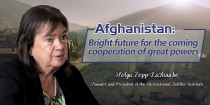Continuing his trip to Africa, Chinese Foreign Minister Wang Yi has added two more African nations who have signed an MOU on cooperation with the Belt and Road Initiative, namely, the Democratic Republic of Congo and Botswana, bringing the number of African countries who are part of the BRI to 46. Wang Yi also visited Nigeria, which has already benefited from its participation in the BRI. And during the visit, Wang Yi signed a series of agreements with Nigeria and promised to aid in helping the country fight the COVID epidemic. China and Nigeria have a lengthy and multifaceted economic relationship with cooperation in railway construction, free trade zones, currency swaps, satellite launches, and other fields.
Speaking at a joint press conference together with his Nigerian counterpart, Wang Yi said, “We will set up an intergovernmental committee to be led by the two countries’ foreign ministers that will coordinate and advance mutually beneficial cooperation in various fields; we will deepen the Belt and Road cooperation by closely aligning China’s new development paradigm with Nigeria’s new national development plan; we will vigorously promote the construction of key projects in Nigeria so as to help Nigeria accelerate industrialization and improve its independent development capabilities; we will continue to extend cooperation into areas including digital economy and green economy so as to achieve diversified development.” China is also cooperating with Nigeria in the realm of military security.
In the DRC, China agreed that, given the COVID epidemic, the DRC did not have to repay the loans to China that were due at the end of 2020. China is also prepared to work with the DRC in order to help them overcome the pandemic. The DRC will also hold the chairmanship of the African Union this year.
Then, in his visit to Botswana, Wang Yi signed an additional BRI MOU. In his comments, Wang said, “The joint construction of the BRI will provide new opportunities for the two countries to deepen mutually beneficial cooperation, expand new fields, open up new prospects, help Botswana’s infrastructure construction and national modernization process, and better benefit the two peoples.”












